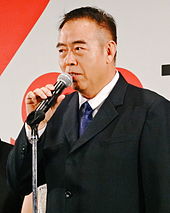Chen Kaige
Chén Kǎigē ( Chinese 陳凱歌 / 陈凯歌 ; born August 12, 1952 in Beijing , People's Republic of China ) is a film director and author. As a representative of the 'fifth generation', he contributed a lot to the reputation of Chinese film .
Life
Chen comes from a film family. His father worked as a director for opera films in the Beijing film studio. His mother wrote scripts. Attendance at a very prestigious middle school in Beijing was brief. After entering school in 1965, he got caught up in the maelstrom of the Cultural Revolution in 1966. In 1968, like many other pupils and students, he was forcibly sent to a remote part of the country to work, in his case to Yunnan , where he stayed until 1972. Chen Kaige has summarized the experiences of this time in his book Children of the Dragon , his third film King of the Childrentakes up topics from the book and its memories. In Yunnan, Chen worked on a rubber plantation. His athletic talent in basketball helped him to get a place in the army after a few years and thus made it possible to return to Beijing in the long term, where he worked in a factory. After the end of the Cultural Revolution and with the normalization of public and social life, the Beijing Film Academy also opened its doors again. In 1978, Chen belonged to the first class with Zhang Yimou , who they left in 1982 after four years with a degree. He was initially accommodated in the studio where his father worked. The breakthrough, however, came when he followed Zhang's suggestion and went with him to the Guangxi Studio, a small film company that was far enough away from Beijing to be able to try out new things fairly unobserved. This is where the film “ Yellow Earth” was made in 1984 , which consistently broke with the traditional and narrow aesthetic, narrative and political norms. China was back on the international filmmaking map. Chen Kaige's film Farewell, My Concubine, based on the novel of the same name by Lilian Lee , has received numerous European awards ( BAFTA , Palme d'Or in Cannes ) and was nominated for an Oscar in the category of Best Foreign Language Film . Chen Kaige lived abroad for a few years and also made a film in Hollywood, Killing Me Softly (2002), but has since returned to China.
Filmography (selection)
- 1984: Yellow Earth (黄 土地; Huáng tǔdì )
- 1986: The great military parade (大 阅兵; Dà yuèbīng )
- 1987: King of the Children (孩子 王; Háizi wáng )
- 1991: The Prophecy (边走边唱; Biān zǒubiān chàng )
- 1993: Farewell, my concubine (霸王别姬; Bàwáng bié jī )
- 1996: Seductive Moon (风月; Fēngyuè )
- 1998: The emperor and his assassin (荆轲刺秦王; Jīngkē cì qínwáng )
- 2002: Killing Me Softly
- 2002: Xiao's way (和 你 在一起; Hé nǐ zài yīqǐ )
- 2002: Contribution to the episode film Ten Minutes Older : The Trumpet
- 2005: Wu Ji - The Riders of the Winds
- 2007: Chacun son cinéma ou Ce petit coup au cœur quand la lumière s'éteint et que le film commence (Zhanxiou Village segment)
- 2010: Sacrifice (赵氏孤儿; Zhào shì gū'ér )
literature
- 1991 Children of the Dragon (autobiography of Chen's youth during the Cultural Revolution) ISBN 3-378-00564-5
- Stefan Kramer: History of Chinese Film , Stuttgart and Weimar: Metzler, 1997, p. 156ff.
Web links
- Chen Kaige in the Internet Movie Database (English)
- "It's all fantasy": Interview with Chen Kaige about his film Wu-Ji - The Riders of the Wind on critic.de
Individual evidence
- ↑ Werner Pluta: Rebellion is justified: The filmmaker Chen Kaige describes his youth in the cultural revolution
| personal data | |
|---|---|
| SURNAME | Chen, Kaige |
| ALTERNATIVE NAMES | Chén, Kǎigē; 陳凱歌; 陈凯歌 |
| BRIEF DESCRIPTION | Chinese director and writer |
| DATE OF BIRTH | August 12, 1952 |
| PLACE OF BIRTH | Beijing |
